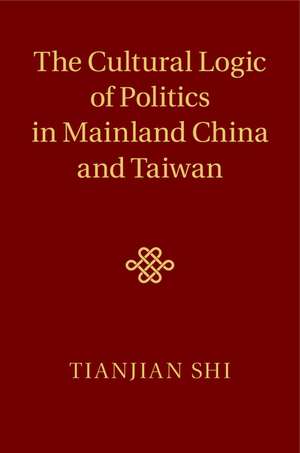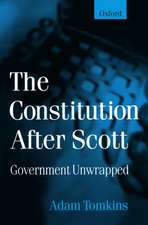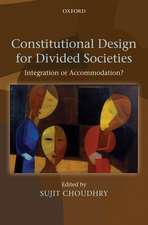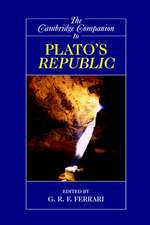The Cultural Logic of Politics in Mainland China and Taiwan
Autor Tianjian Shien Limba Engleză Hardback – 14 dec 2014
| Toate formatele și edițiile | Preț | Express |
|---|---|---|
| Paperback (1) | 286.51 lei 43-57 zile | |
| Cambridge University Press – 19 ian 2020 | 286.51 lei 43-57 zile | |
| Hardback (1) | 682.42 lei 43-57 zile | |
| Cambridge University Press – 14 dec 2014 | 682.42 lei 43-57 zile |
Preț: 682.42 lei
Preț vechi: 793.51 lei
-14% Nou
Puncte Express: 1024
Preț estimativ în valută:
130.59€ • 135.52$ • 109.16£
130.59€ • 135.52$ • 109.16£
Carte tipărită la comandă
Livrare economică 17-31 martie
Preluare comenzi: 021 569.72.76
Specificații
ISBN-13: 9781107011762
ISBN-10: 1107011760
Pagini: 316
Ilustrații: 49 b/w illus. 46 tables
Dimensiuni: 155 x 239 x 25 mm
Greutate: 0.54 kg
Editura: Cambridge University Press
Colecția Cambridge University Press
Locul publicării:New York, United States
ISBN-10: 1107011760
Pagini: 316
Ilustrații: 49 b/w illus. 46 tables
Dimensiuni: 155 x 239 x 25 mm
Greutate: 0.54 kg
Editura: Cambridge University Press
Colecția Cambridge University Press
Locul publicării:New York, United States
Cuprins
Part I. Theory of Popular Culture: 1. Political culture theory and regime stability; 2. Cultural norms in the East and West; 3. Measuring cultural norms in mainland China and Taiwan; 4. The relationship among culture, structure, and institutions; Part II. Culture's Impacts on Politics: 5. The impact of culture on political trust; 6. Cultural impacts on political participation; 7. Cultural impacts on people's understanding of democracy; 8. Conclusion and theoretical reflection.
Recenzii
'Over the course of his career, Tianjian Shi came to realize that culture could not be dismissed as irrelevant to the politics of nations. Instead, it kept resurfacing as a critical determinant of political legitimacy, participation, interests and leadership. This final casebook of a great detective solves once and for all the puzzle of culture. It will serve as a model for anyone on the trail of culture.' Bruce Gilley, Portland State University
'This book is Shi's most ambitious. It is at once both a circling back to his personal and scholarly roots and a stretching of his reach and ambition. He develops this account - of individual and social norms and how they shape cultural understandings of rationality and orientations to authority - remarkably well. Nothing is a 'fitting tribute', but his own words come close.' John Aldrich, Pfizer-Pratt University Professor of Political Science, Duke University
'Tianjian Shi has written an important book that investigates culture as norms. Through comparative survey work in mainland China and Taiwan, Shi illuminates the workings of cultural commonalities in distinctly different institutional settings. Not least of all, Shi reveals a common hierarchical orientation to authority, with roots in traditional Chinese culture, that provides legitimacy to a communist party-state in one setting and is the source of democratic tensions in the other. A theoretical and empirical tour de force.' Melanie Manion, Vilas-Jordan Distinguished Achievement Professor of Public Affairs and Political Science, University of Wisconsin, Madison
'A pioneer of survey research in China, the late Tianjian Shi left a rich intellectual legacy in this book. Using multiyear survey data from China and Taiwan, one authoritarian and one democratic, to examine the interactions between political culture and political behavior, Shi demonstrated that cultural changes are relatively independent of social structural and political institutional changes. A fascinating study, this book provides many fresh and original insights into the ongoing debate of political modernization.' Suisheng Zhao, University of Denver, and editor of Journal of Contemporary China
'This groundbreaking study offers not only a new fully-fledged theory of political culture but also the most credible answer to East Asia's political puzzle of democratic underdevelopment. It also challenges the increasingly popular claims among neo-modernization theorists in the West that China and all other East Asian economic powerhouses will join the exclusive club of fully liberal democracies in a couple of decades. Among Asian-born scholars, therefore, the late Tianjian Shi should be remembered as the most brilliant theoretical pioneer.' Doh Chull Shin, Center for the Study of Democracy, University of California, Irvine
'This is a remarkable achievement: not just a cultural explanation of Chinese politics, but a new theory of culture that has applications well beyond China. Innovative ideas, sophisticated data analysis, provocative conclusions - it is the culmination of Tianjian Shi's lifetime of scholarship and will stand as his ultimate legacy.' Bruce Dickson, Director, Sigur Center for Asian Studies, and Professor, George Washington University
'A valuable work written mainly for academic political scientists, it belongs in all large university libraries.' J. A. Rhodes, Choice
'The book has many strong points. Especially noteworthy is its extensive discussion of how to think about culture as influencing both attitudes and behavior. A second strength is the close fit between the theoretical discussion and the empirical analyses that follow.' Fritz Gaenslen, Journal of Chinese Political Science
'This book is Shi's most ambitious. It is at once both a circling back to his personal and scholarly roots and a stretching of his reach and ambition. He develops this account - of individual and social norms and how they shape cultural understandings of rationality and orientations to authority - remarkably well. Nothing is a 'fitting tribute', but his own words come close.' John Aldrich, Pfizer-Pratt University Professor of Political Science, Duke University
'Tianjian Shi has written an important book that investigates culture as norms. Through comparative survey work in mainland China and Taiwan, Shi illuminates the workings of cultural commonalities in distinctly different institutional settings. Not least of all, Shi reveals a common hierarchical orientation to authority, with roots in traditional Chinese culture, that provides legitimacy to a communist party-state in one setting and is the source of democratic tensions in the other. A theoretical and empirical tour de force.' Melanie Manion, Vilas-Jordan Distinguished Achievement Professor of Public Affairs and Political Science, University of Wisconsin, Madison
'A pioneer of survey research in China, the late Tianjian Shi left a rich intellectual legacy in this book. Using multiyear survey data from China and Taiwan, one authoritarian and one democratic, to examine the interactions between political culture and political behavior, Shi demonstrated that cultural changes are relatively independent of social structural and political institutional changes. A fascinating study, this book provides many fresh and original insights into the ongoing debate of political modernization.' Suisheng Zhao, University of Denver, and editor of Journal of Contemporary China
'This groundbreaking study offers not only a new fully-fledged theory of political culture but also the most credible answer to East Asia's political puzzle of democratic underdevelopment. It also challenges the increasingly popular claims among neo-modernization theorists in the West that China and all other East Asian economic powerhouses will join the exclusive club of fully liberal democracies in a couple of decades. Among Asian-born scholars, therefore, the late Tianjian Shi should be remembered as the most brilliant theoretical pioneer.' Doh Chull Shin, Center for the Study of Democracy, University of California, Irvine
'This is a remarkable achievement: not just a cultural explanation of Chinese politics, but a new theory of culture that has applications well beyond China. Innovative ideas, sophisticated data analysis, provocative conclusions - it is the culmination of Tianjian Shi's lifetime of scholarship and will stand as his ultimate legacy.' Bruce Dickson, Director, Sigur Center for Asian Studies, and Professor, George Washington University
'A valuable work written mainly for academic political scientists, it belongs in all large university libraries.' J. A. Rhodes, Choice
'The book has many strong points. Especially noteworthy is its extensive discussion of how to think about culture as influencing both attitudes and behavior. A second strength is the close fit between the theoretical discussion and the empirical analyses that follow.' Fritz Gaenslen, Journal of Chinese Political Science
Notă biografică
Descriere
This book uses surveys, statistics, and case studies to explain why and how cultural norms affect political attitudes and behavior.


















